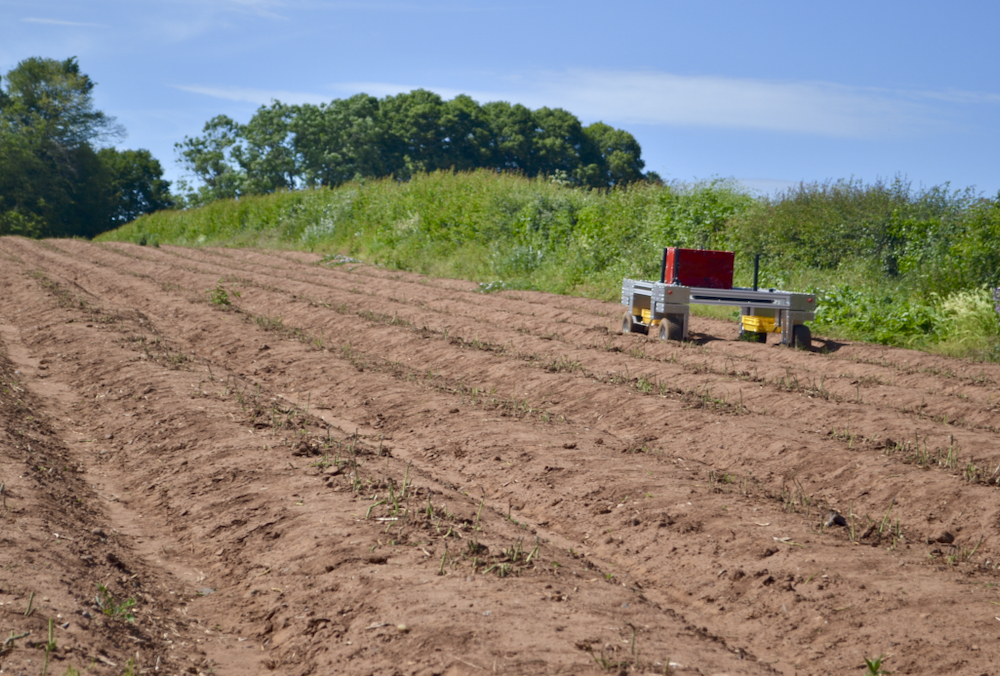UK start-up hopes to bring asparagus harvesting robot to Canada

An emerging network of international partnerships has resulted in a United Kingdom-based agri-tech start-up looking to bring its automated asparagus harvesting robot to Canada.
Muddy Machines is in the first cohort of a virtual residency program focused on advanced manufacturing technology. It is hosted by the MaRS Discovery District in Toronto in partnership with Innovate UK.
It’s the first one under the U.K.’s Global Incubator program; a second focused on agriculture has just been announced with Cultivator in Saskatchewan.
Why it matters: The U.K.’s exit from the European Union is opening new opportunities for Canada to strengthen historical ties with the United Kingdom, including more possibilities for trade and partnerships.
“We see this as a building block to a stronger relationship with the U.K. The U.K. has shifted priorities and we see a lot of potential benefit in doing more with them,” says Jason MacFarlane, head of advanced manufacturing, Venture Services, at MaRS.
The residency became virtual due to COVID-19 when it kicked off in September, with eight U.K. companies participating in the program. Cohort members have access to MaRS’ venture services and entrepreneurship programming and business, technical and advisory support.
“We love to support and grow Canadian technology, but, in some cases, bringing technology from elsewhere here can also strengthen our small and medium-sized enterprises,” MacFarlane adds. “We also see an opportunity for companies to set up Canadian divisions and hire local talent.”
Pre-COVID, Canada’s largest agriculture-focused accelerator, Bioenterprise, participated in trade missions to the U.K., France, Netherlands and Ireland and hosted delegations from Japan, China and India.
“International relationships are key, and they have died off in the last 18 months, so now it is time to re-establish them and prepare for post-COVID,” says chief executive officer Dave Smardon.
Saskatchewan-based Cultivator, billed as Canada’s first credit union-led business incubator, is accepting applications for its first cohort of 10 Canadian and five U.K. companies in its Agtech Accelerator as part of its new partnership with Innovate UK.
According to incubator manager Jordan McFarlen, a key part of the program is giving entrepreneurs access to farmers, as well as ensuring entrepreneurs have access to capital, which Cultivator will enable through its partnership with Emmertech Venture Capital Fund.
“We want to support early-stage agtech companies and bring a farmer voice to the innovation table,” McFarlen notes, adding Cultivator is looking for farmers from across Canada willing to share their insights with the incoming cohort and give honest feedback on the innovations they are building.
Muddy Machines co-founder Florian Richter says he looks forward to introducing Sprout, the company’s asparagus harvesting robot, to growers in North America. In working with U.K. farmers during the early months of COVID-19, Richter and his co-founder Christopher Chavasse discovered a real need for a solution to address farmers’ labour woes.
“In spring 2020, the largest asparagus grower in the U.K. told me, my (labour) problem is so severe that if we don’t fix it, in five years, we will have no more asparagus here,” Richter says. “Asparagus is super labour-intensive, and this was one thing the entire industry was complaining about with one voice.”
In six months, Richter and Chevasse developed and tested a lightweight and autonomous multipurpose robot that uses its vision and artificial intelligence systems to identify and select asparagus spears ready for harvest.
Using its robotic arm, Sprout delivers a clean, precise ground-level cut that doesn’t damage the delicate spear.
The current prototype can run 12 to 16 hours daily and pick at the rate of two to three people. The goal is to have one robot take the place of 10 workers. Sprout 2.0 is being built for commercial harvest trials in the U.K. next spring, and Richter is keen to use the MaRS program to learn more about the manufacturing end of bringing his innovation to market.
His initial vision is to provide small fleets or swarms of Sprouts to growers as needed for asparagus harvest and then retool them for service on other farms to harvest other crops. The machines can also be adapted to tasks like weeding or scouting.
Source: Farmtario.com

